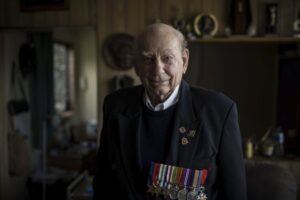Four formative years: How Bert Biggs’ WWII heroics earned him a legion of French admirers

Save articles for later
Add articles to your saved list and come back to them any time.
Bert Biggs was 19 when he signed up for the Air Force.
It was 1942, and Australia was at war. Because of his job making gas masks at the Maribyrnong munitions factory, Biggs was considered an essential worker. But when his brother, Sid, came home one day in a fresh Army uniform, Biggs decided to follow him into war.
World War II veteran Herbert “Bert” Biggs in the home he built in 1949.Credit: Darrian Traynor
In the following years, he travelled to Egypt, Corsica, mainland France, Italy and Britain as a mechanic fixing Spitfires in the Royal Australian Air Force’s 451 Squadron. He lost friends, met men who became family and was nearly killed in a German air raid.
Biggs, who will turn 100 in June, still lives in the Thornbury home he built himself in the late 1940s. He now has a dozen great-grandchildren who will help him march to the Shrine of Remembrance on Anzac Day.
Bert Biggs served in the Royal Australian Air Force (RAAF) No. 451 Squadron during WWII.
Biggs says the day initially didn’t mean much to him. But one day, after his car was sideswiped, he ran into an old squadron friend at a Northcote panel beaters. His former comrade headed the Desert Air Force Association and asked him to join the Anzac Day march. He has been attending ever since.
“I always thought of the lads who were killed,” Biggs says. “Once I got really involved with the association, it hit home more than ever.”
May 12, 1944, stands out for Biggs. That night, a German air raid on a Corsica airstrip killed eight people in his squadron.
“The guys that were killed were like brothers,” Biggs says. “I still can hear them. Some of them were so badly injured they were screaming.”
Biggs, who grew up on a spud farm in Toolangi in the hills to Melbourne’s north-east, was almost killed by a shrapnel-laden antipersonnel bomb himself.
“Curiosity got the better of me,” he recalls. “I stood up to watch what was going on, and I was dragged down by my future brother-in-law. And when I hit the bottom of the trench, that was when a bomb landed right on the top.”
World War II veteran Bert Biggs will turn 100 in June.Credit: Darrian Traynor
“It would’ve finished me off, but I was lucky.”
Five years ago, at the age of 95, Biggs returned to Corsica – a year after his wife, Lorna, died aged 94.
He received a hero’s welcome and was made the guest of honour at the island’s VE Day celebrations. Two years before that, Biggs received the French Legion of Honour award for his service supporting Allied bombing runs from the island. His squadron managed to fix a dozen planes less than a day after the devastating May 1944 air raid that killed his comrades.
On the anniversary of the raid, he lit candles at the cemetery where his mates were buried.
Allied troops playing volleyball in Corsica.
“It was enjoyable to go back, but it was emotional as well,” he says. “We knew each other, and we lived with each other.”
In a memoir his family helped compile, Biggs says his war experience “was a short time really, only four years, but it made a huge impact on my life”.
In Egypt, he remembers a pilot going down behind enemy lines and miraculously returning days later. George O’Neil ditched his flight suit for local Arabian garb, and when approached by the Germans, he waved and copied the locals, saying “fursah sa’idah” – an Arabic greeting. He was forever known as “Sa’idah George”.
In England, Biggs recalls scurrying around a small brick toilet block to hide from a circling German fighter plane’s machine gun. When his comrades saw he had blood streaming from his forehead, they were worried he’d been hit. Thankfully, he’d only tripped and fallen onto someone’s steel-capped boot.
A German air raid in May 1944 destroyed many of 451 Squadron’s planes, but a mammoth effort from RAAF ground crew meant all but two of its Spitfires were serviceable by the next afternoon.
Biggs also remembers his Allied companions in Corsica. The British were proud aviators and were horrified the Australians didn’t salute their officers. But the Americans “did some funny things”.
“I can never understand the Americans. They never dug a trench. They lined their tents up in streets, so the Germans would come down and strafe the whole lot,” he says.
The same air raid that killed eight of Biggs’ comrades killed 30 Americans and wounded 100.
“Any war is terrible – even the wars going on now are shocking,” Biggs says. “But the memories and how they are celebrated are good, I think, especially for younger people. It helps them keep in mind what could be, and hopefully, what won’t be.”
The Morning Edition newsletter is our guide to the day’s most important and interesting stories, analysis and insights. Sign up here.
Most Viewed in National
From our partners
Source: Read Full Article





